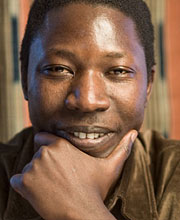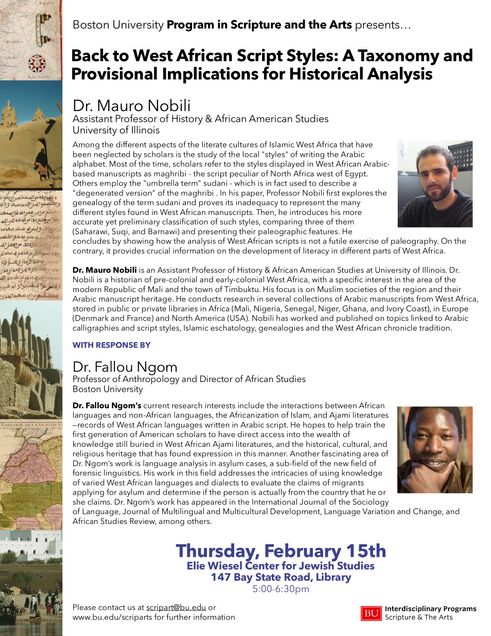Back to West African Script Styles: A Taxonomy and Provisional Implications for Historical Analysis
Thursday, February 15th, 5:00-6:30pm: Professor Mauro Nobili, with response by Professor Fallou Ngom
 Dr. Mauro Nobili is an Assistant Professor of History & African American Studies at University of Illinois. Dr. Nobili is a historian of pre-colonial and early-colonial West Africa, with a specific interest in the area of the modern Republic of Mali and the town of Timbuktu. His focus is on Muslim societies of the region and their Arabic manuscript heritage. He conducts research in several collections of Arabic manuscripts from West Africa, stored in public or private libraries in Africa (Mali, Nigeria, Senegal, Niger, Ghana, and Ivory Coast), in Europe (Denmark and France) and North America (USA). Nobili has worked and published on topics linked to Arabic calligraphies and script styles, Islamic eschatology, genealogies and the West African chronicle tradition.
Dr. Mauro Nobili is an Assistant Professor of History & African American Studies at University of Illinois. Dr. Nobili is a historian of pre-colonial and early-colonial West Africa, with a specific interest in the area of the modern Republic of Mali and the town of Timbuktu. His focus is on Muslim societies of the region and their Arabic manuscript heritage. He conducts research in several collections of Arabic manuscripts from West Africa, stored in public or private libraries in Africa (Mali, Nigeria, Senegal, Niger, Ghana, and Ivory Coast), in Europe (Denmark and France) and North America (USA). Nobili has worked and published on topics linked to Arabic calligraphies and script styles, Islamic eschatology, genealogies and the West African chronicle tradition.
Among the different aspects of the literate cultures of Islamic West Africa that have been neglected by scholars is the study of the local “styles” of writing the Arabic alphabet. Most of the time, scholars refer to the styles displayed in West African Arabic-based manuscripts as maghribi – the script peculiar of North Africa west of Egypt. Others employ the “umbrella term” sudani – which is in fact used to describe a “degenerated version” of the maghribi . In his paper, Professor Nobili first explores the genealogy of the term sudani and proves its inadequacy to represent the many different styles found in West African manuscripts. Then, he introduces his more accurate yet preliminary classification of such styles, comparing three of them (Saharawi, Suqi, and Barnawi) and presenting their paleographic features. He concludes by showing how the analysis of West African scripts is not a futile exercise of paleography. On the contrary, it provides crucial information on the development of literacy in different parts of West Africa.
 Dr. Fallou Ngom’s current research interests include the interactions between African languages and non-African languages, the Africanization of Islam, and Ajami literatures—records of West African languages written in Arabic script. He hopes to help train the first generation of American scholars to have direct access into the wealth of knowledge still buried in West African Ajami literatures, and the historical, cultural, and religious heritage that has found expression in this manner. Another fascinating area of Dr. Ngom’s work is language analysis in asylum cases, a sub-field of the new field of forensic linguistics. His work in this field addresses the intricacies of using knowledge of varied West African languages and dialects to evaluate the claims of migrants applying for asylum and determine if the person is actually from the country that he or she claims. Dr. Ngom’s work has appeared in the International Journal of the Sociology of Language, Journal of Multilingual and Multicultural Development, Language Variation and Change, and African Studies Review, among others.
Dr. Fallou Ngom’s current research interests include the interactions between African languages and non-African languages, the Africanization of Islam, and Ajami literatures—records of West African languages written in Arabic script. He hopes to help train the first generation of American scholars to have direct access into the wealth of knowledge still buried in West African Ajami literatures, and the historical, cultural, and religious heritage that has found expression in this manner. Another fascinating area of Dr. Ngom’s work is language analysis in asylum cases, a sub-field of the new field of forensic linguistics. His work in this field addresses the intricacies of using knowledge of varied West African languages and dialects to evaluate the claims of migrants applying for asylum and determine if the person is actually from the country that he or she claims. Dr. Ngom’s work has appeared in the International Journal of the Sociology of Language, Journal of Multilingual and Multicultural Development, Language Variation and Change, and African Studies Review, among others.
Event will be held in the library at the Boston University Elie Wiesel Center for Jewish Studies (147 Bay State Road Boston, MA 02215) on Thursday, February 15th from 5:00-6:30. All interested faculty, graduate and undergraduate students are encouraged to attend.
